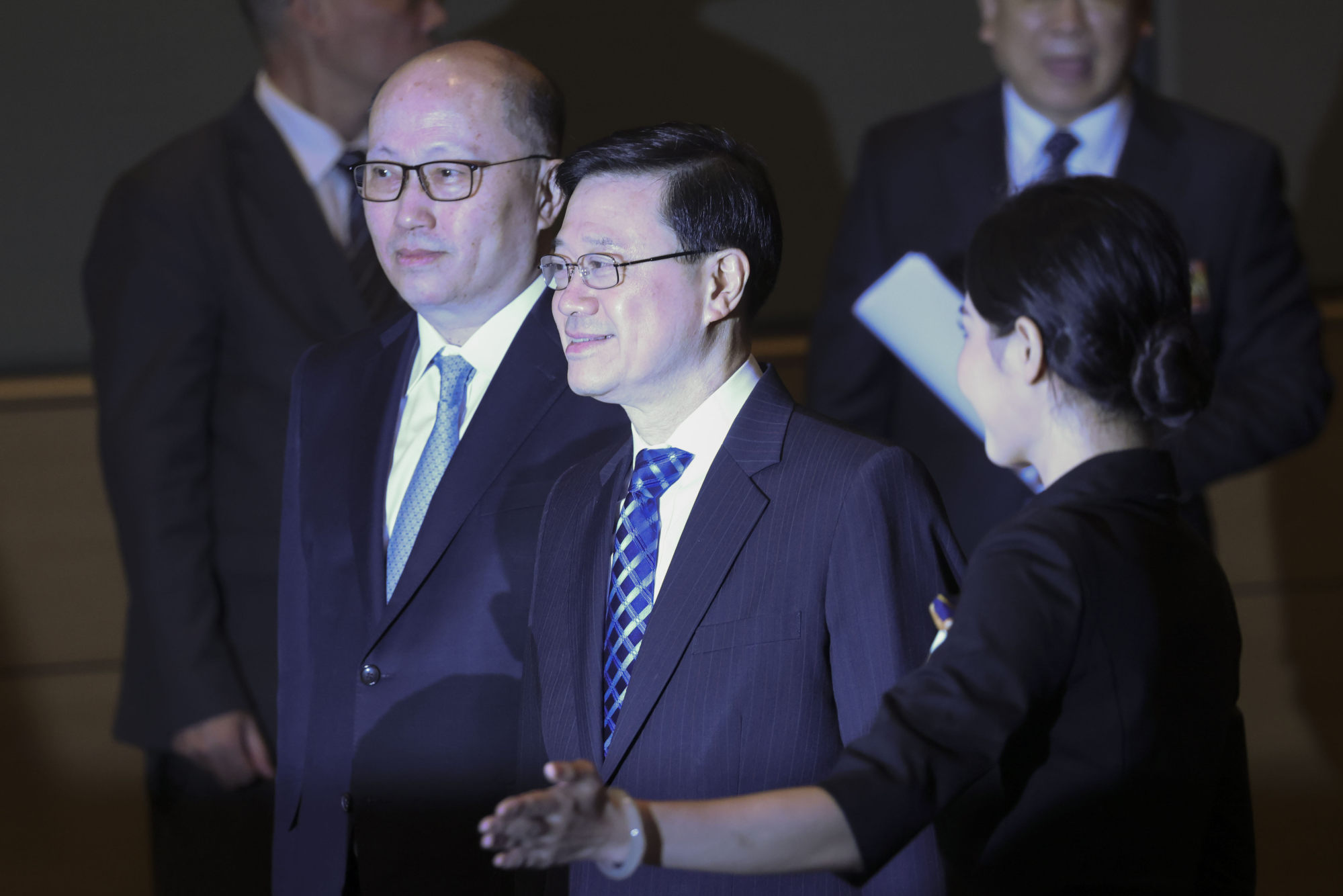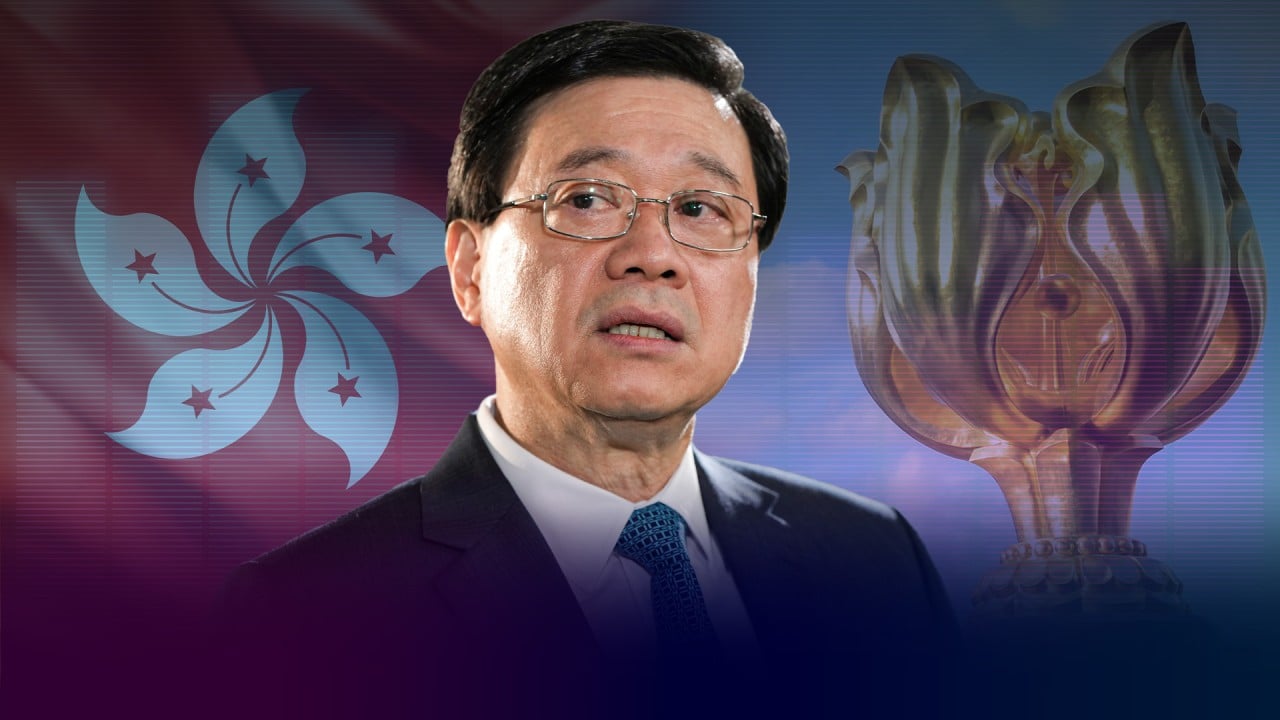
Hong Kong leader John Lee promises more overseas trips and closer cooperation with emerging economies to boost city’s development
- Lee tells business conference city must continue to cultivate its links with developed countries, but be on the alert for opportunities elsewhere
- Zheng Yanxiong, director of central government’s liaison office, says city should ‘expand international perspectives’ and ‘break away from habitual thinking’
Even though the global economy is slowing, Hong Kong still has a lot going for it, the city’s leader has said as he unveiled plans for more overseas visits to boost links with emerging economies and enable the financial hub to be a better bridge to mainland China.
They also include memorandums of understanding to build smart ports in the Greater Bay Area and an innovation collaboration between the University of Hong Kong and a Vietnamese tech company.

“This is a good example of various sectors getting united to open a new chapter of prosperity for Hong Kong,” Lee said.
“I am confident that with the concerted effort of the whole society and the limitless support of the country … Hong Kong will be able to scale new heights and become more prosperous.”
He told the symposium that the city had solid economic and trade links with advanced economies that should continue to be cultivated, but that other avenues should also be considered.
Lee was backed by Zheng Yanxiong, the director of the central government’s liaison office, who told the conference that the city should get more creative in the ways it used to drum up international and domestic business.
The chief executive highlighted the 33 agreements signed with Singapore, Malaysia and Indonesia on a visit to the Asean countries last week and the 13 deals signed in Saudi Arabia and the United Arab Emirates earlier this year.
Some 16 “cooperation projects” spanning different sectors had been added since the visits, he said.
“My team and I will continue to lead delegations to visit overseas countries, with an open attitude to strengthening cooperation with more emerging economies in Asia and internationally, and expand Hong Kong’s important role as a bridge linking the mainland and international markets,” Lee said.

The symposium, on the theme of “unleashing the impetus for greater prosperity of Hong Kong”, was organised by the Hong Kong Trade Development Council and seven chambers of commerce.
The city government and Beijing’s liaison office in Hong Kong acted as advisers for the event, held at the Hong Kong Convention and Exhibition Centre.
Zheng told the conference all sectors in the city should work to “expand international perspectives, break away from habitual thinking and actively seek change and innovation”.
He also appealed to businesses to join forces to make the best use of national development strategies for Hong Kong’s benefit.
“Do not ask for the origin of a hero. Whether they are Hong Kong, mainland or foreign-funded, whether they are business tycoons or grass roots, as long as everyone does not argue or fight internally, seeks common ground while reserving differences, and works together, there will be new consensus for development,” Zheng said.
“And that will contribute to a mighty force to build a better Hong Kong.”
A booklet given to delegates at the symposium included a list of work by the government and the business world to boost the economy since July last year.
Much of the effort involved mainland and Hong Kong cooperation, such as plans for the issue of 30 billion yuan (US$4.17 billion) in national bonds by the Ministry of Finance and a memorandum signed between the city government and the Cyberspace Administration of China to allow data flow across the GBA area.
Jonathan Choi Koon-shum, chairman of the Chinese General Chamber of Commerce, who spoke at the symposium, told the Post afterwards that the mainland was the engine that would energise the Hong Kong economy.
He emphasised that without that support the city would be considered less important by investors.
“But the mainland is not the only source. The overseas networks are equally important to fuel Hong Kong’s growth,” Choi said.
“We need to be more proactive … more creative to explore new courses and new growth points,” Chan said.
He said the Office for Attracting Strategic Enterprises (OASES), part of his portfolio, had contacted more than 150 enterprises since it was set up last year.
OASES was designed to focus on strategic industries such as life and health technology, artificial intelligence, financial technology and advanced manufacturing.
Secretary for Innovation, Technology and Industry Sun Dong, who also spoke at the conference, said about 25 of the businesses were prepared to settle in Hong Kong or had already set up operations.
“In general, they plan to invest more than HK$100 million [US$12.8 million] in Hong Kong in the coming few years, hiring over 100 people, while some of them even plan to invest several billions of dollars and employ nearly 1,000 people,” Sun said.



